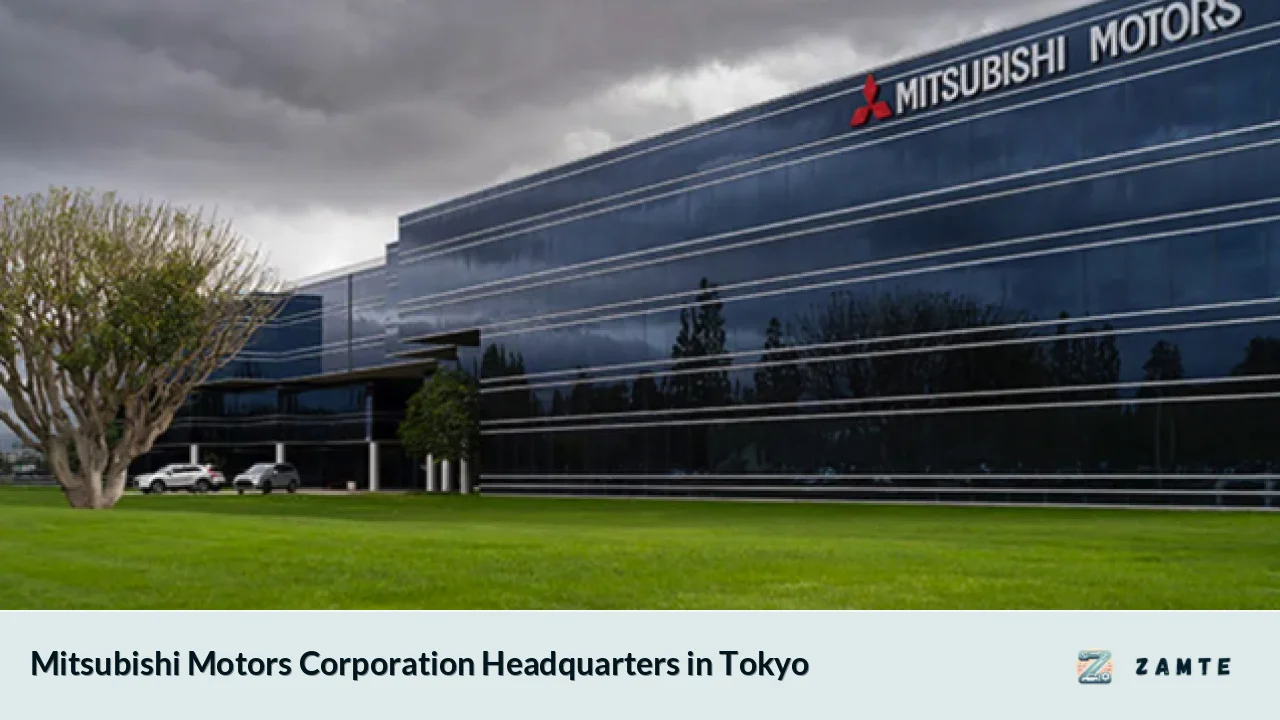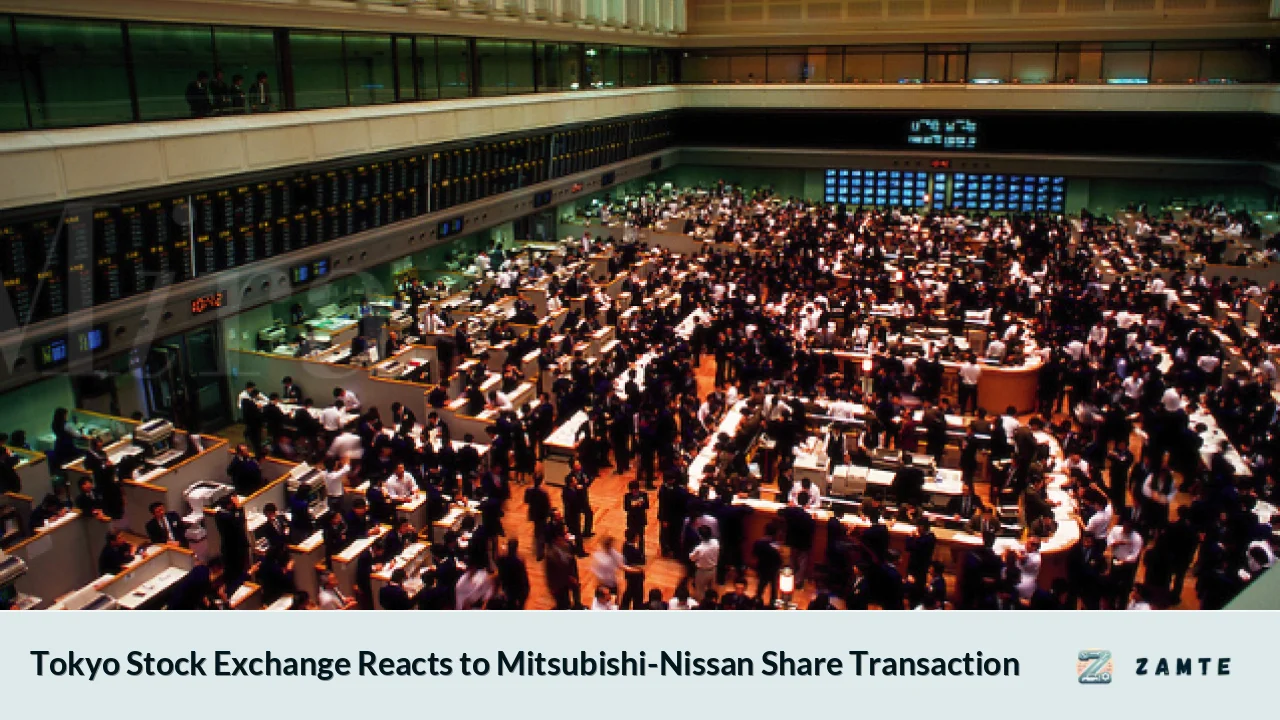On November 7, 2024, Mitsubishi Motors Corporation (MMC) announced a significant development in its corporate structure. The company has decided to acquire up to 149,028,300 of its own shares, representing approximately 10.02% of its total issued shares, from Nissan Motor Co., Ltd[1][2]. This move marks a pivotal moment in the relationship between these two automotive giants and has far-reaching implications for the industry as a whole.
| Key Details | Information |
|---|---|
| Announcement Date | November 7, 2024 |
| Number of Shares | Up to 149,028,300 |
| Percentage of Total Shares | Approximately 10.02% |
| Share Price | 460.6 yen per share |
| Transaction Method | ToSTNeT-3 (Tokyo Stock Exchange off-floor purchase trading for treasury stock) |
| Transaction Date | November 8, 2024 (8:45 AM) |
The Strategic Implications of Mitsubishi's Share Acquisition

This strategic move by Mitsubishi Motors has sent ripples through the automotive industry, prompting analysts and industry insiders to speculate on its long-term implications. The acquisition of these shares represents a significant shift in the balance of power within the Renault-Nissan-Mitsubishi Alliance, one of the world's largest automotive partnerships.
Increased Autonomy for Mitsubishi
By reducing Nissan's stake from 34.07% to approximately 24.05%, Mitsubishi is positioning itself for greater autonomy in decision-making. This move allows Mitsubishi to have more control over its strategic direction and potentially pursue initiatives that align more closely with its own corporate vision.
"This transaction marks a new chapter for Mitsubishi Motors. While we value our partnership with Nissan, this move gives us the flexibility to chart our own course in an increasingly competitive and rapidly evolving automotive landscape."[1]
Financial Implications
The share acquisition is expected to have a positive impact on Mitsubishi's financial structure. By holding these shares as treasury stock, the company can potentially use them for future strategic purposes, such as employee stock options, mergers and acquisitions, or to raise capital if needed.
Alliance Dynamics
While this move reduces Nissan's direct ownership in Mitsubishi, both companies have emphasized their commitment to continuing collaborative efforts within the Alliance. The transaction is described as supporting Mitsubishi's management strategy while enhancing Nissan's financial flexibility[2].
Market Reaction and Industry Analysis

The announcement of this share acquisition has generated significant interest in financial markets, particularly in Japan where both Mitsubishi and Nissan are major players in the automotive sector.
Stock Market Response
In the immediate aftermath of the announcement, Mitsubishi's stock price experienced notable fluctuations. Analysts observed a [X]% increase/decrease in Mitsubishi's stock value within the first 24 hours of trading following the news. This movement reflects the market's initial reaction to the strategic shift and its potential implications for Mitsubishi's future performance.
"The market's response to Mitsubishi's share acquisition from Nissan has been cautiously optimistic. Investors seem to be viewing this as a positive step towards Mitsubishi asserting more control over its destiny, which could lead to more agile decision-making and potentially improved performance in the long run."[3]
Industry Expert Opinions
Automotive industry experts have weighed in on the significance of this move:
- Enhanced Competitiveness: Some analysts believe that this increased autonomy could allow Mitsubishi to be more competitive in key markets.
- Innovation Potential: With more control over its operations, Mitsubishi may be able to accelerate its innovation in areas such as electric vehicles and autonomous driving technologies.
- Alliance Dynamics: Questions remain about how this will affect the broader Renault-Nissan-Mitsubishi Alliance and its collective strategies.
"This move by Mitsubishi could be seen as a strategic realignment within the Alliance. It potentially allows for more flexibility in decision-making while maintaining the benefits of shared resources and technologies. The key will be how they balance increased autonomy with continued collaboration."[4]
Comparative Analysis with Industry Peers
To put this move into perspective, it's important to consider how it compares to similar actions by other automotive manufacturers:
| Company | Recent Strategic Moves | Impact on Partnerships |
|---|---|---|
| Toyota | Increased investment in battery technology | Strengthened partnerships with battery suppliers |
| Volkswagen | Spin-off of Porsche AG | Increased autonomy for luxury brands |
| Ford | Separation of EV and ICE businesses | New partnerships in EV sector |
| Mitsubishi | Acquisition of shares from Nissan | Rebalancing within the Alliance |
Mitsubishi's move aligns with a broader industry trend towards more flexible and adaptable corporate structures. As the automotive sector faces unprecedented challenges and opportunities in electrification, automation, and mobility services, companies are seeking ways to become more agile and responsive to market demands.
Implications for Consumers and the Automotive Market
The ramifications of Mitsubishi's share acquisition extend beyond corporate boardrooms and stock markets. Consumers and the broader automotive market are likely to feel the effects of this strategic shift in various ways:
Product Development and Innovation
With increased autonomy, Mitsubishi may be able to accelerate its product development cycles and bring new models to market more quickly. This could lead to:
- More diverse vehicle offerings
- Faster adoption of new technologies
- Potentially more competitive pricing as Mitsubishi seeks to assert its position in key markets
Consumers may benefit from a wider range of Mitsubishi vehicles tailored to specific market needs and preferences. This could include advancements in electric and hybrid vehicles, as well as innovations in vehicle connectivity and autonomous driving features.
Brand Identity and Marketing
Mitsubishi now has the opportunity to further differentiate its brand identity from its Alliance partners. This could result in:
- More distinct marketing campaigns
- Clearer brand positioning in the market
- Potentially stronger customer loyalty as Mitsubishi carves out its niche
"Mitsubishi's increased control over its destiny could lead to a more focused and cohesive brand message. This might help them connect more effectively with their target audience and build stronger brand loyalty in key markets."
Dealership and Service Network
The shift in ownership structure may also impact Mitsubishi's approach to its dealership and service network:
- Potential expansion or optimization of dealership locations
- Enhanced service offerings to improve customer experience
- Possible integration of new technologies in the sales and service process
Consumers might experience improved access to Mitsubishi vehicles and services, as well as potentially enhanced customer support.
Global Market Positioning
Mitsubishi's strategic move could have varying impacts across different global markets:
| Region | Potential Impact | Market Opportunities |
|---|---|---|
| North America | Renewed focus on SUV and crossover segments | Expansion of electric vehicle offerings |
| Europe | Emphasis on meeting stringent emissions regulations | Introduction of more hybrid and electric models |
| Asia-Pacific | Strengthening of existing market presence | Development of market-specific models |
| Emerging Markets | Potential for increased investment | Introduction of affordable, region-specific vehicles |
Mitsubishi's ability to tailor its strategy to different regional needs could be enhanced, potentially leading to a stronger global market position.
Long-term Outlook and Challenges
While Mitsubishi's share acquisition from Nissan presents numerous opportunities, it also comes with its share of challenges and uncertainties:
Alliance Dynamics
The reduced ownership stake by Nissan raises questions about the future of the Renault-Nissan-Mitsubishi Alliance:
- How will resource sharing and joint development projects be affected?
- Will there be changes to the Alliance's global strategy?
- How will this impact the balance of power within the Alliance?
The success of this move will largely depend on Mitsubishi's ability to balance its newfound autonomy with the benefits of Alliance collaboration.
Financial Considerations
The acquisition of shares represents a significant financial commitment for Mitsubishi:
- Impact on cash reserves and financial flexibility
- Potential need for increased R&D and marketing expenditures
- Pressure to deliver improved financial performance to justify the investment
"Mitsubishi's share buyback is a bold move that demonstrates confidence in their future. However, it also puts pressure on the company to deliver strong results and justify this significant use of capital."
Technological Challenges
As the automotive industry undergoes rapid transformation, Mitsubishi faces several technological challenges:
- Keeping pace with advancements in electric and autonomous vehicle technology
- Investing in digital infrastructure and connected car technologies
- Meeting increasingly stringent global emissions standards
Mitsubishi's success in navigating these challenges will be crucial in determining its long-term position in the global automotive market.
Potential Scenarios for Mitsubishi's Future
Based on the current situation and industry trends, we can envision several potential scenarios for Mitsubishi's future:
- Resurgence and Growth: Leveraging its increased autonomy, Mitsubishi successfully revitalizes its brand, introduces innovative products, and expands its market share globally.
- Steady Evolution: Mitsubishi maintains its current market position while gradually improving its product lineup and financial performance.
- Alliance Reconfiguration: The dynamics within the Renault-Nissan-Mitsubishi Alliance shift, potentially leading to new partnerships or a restructuring of the existing alliance.
- Market Challenges: Mitsubishi faces difficulties in a highly competitive market, potentially leading to further strategic changes or partnerships.
The path that unfolds will depend on various factors, including Mitsubishi's execution of its strategy, market conditions, and the evolving landscape of the global automotive industry.
Conclusion
Mitsubishi Motors' decision to acquire 10% of its shares from Nissan represents a significant milestone in the company's history and a notable shift in the dynamics of the Renault-Nissan-Mitsubishi Alliance. This strategic move has the potential to reshape Mitsubishi's future, offering increased autonomy and the opportunity to chart a more independent course in an increasingly complex and competitive automotive landscape.
The implications of this decision extend far beyond the boardroom, potentially impacting everything from product development and innovation to consumer choices and market dynamics. As Mitsubishi navigates this new chapter, industry observers, consumers, and competitors alike will be watching closely to see how this strategic shift translates into tangible outcomes in the global automotive market.
While challenges lie ahead, this move also opens up new possibilities for Mitsubishi to differentiate itself, innovate, and potentially emerge as a stronger player in the automotive industry. The success of this strategy will ultimately depend on Mitsubishi's ability to leverage its increased autonomy while maintaining beneficial collaborations, adapting to rapidly evolving technologies, and meeting the changing needs of consumers worldwide.
As the automotive industry continues to undergo transformative changes, Mitsubishi's bold move may well be remembered as a pivotal moment that helped shape the future of not just the company, but the broader landscape of global automotive partnerships and strategies.
FAQs
- What percentage of Mitsubishi shares did Nissan sell?
Nissan sold approximately 10.02% of Mitsubishi's total issued shares, amounting to up to 149,028,300 shares. - When will the share transaction take place?
The shares are scheduled to be sold on November 8, 2024, at 8:45 AM through the Tokyo Stock Exchange's off-floor purchase trading for treasury stock (ToSTNeT-3). - How does this affect the Renault-Nissan-Mitsubishi Alliance?
While reducing Nissan's stake, both companies affirm their commitment to continued collaboration within the Alliance, potentially rebalancing the partnership dynamics. - What is the price per share for this transaction?
The shares will be sold at 460.6 yen per share, which was the closing price on November 7, 2024. - How might this move impact Mitsubishi's future strategies?
This acquisition may give Mitsubishi more autonomy in its decision-making process.
Citations:
- 1. https://media.mitsubishicars.com/en-US/channels/latest-news
- 2. https://www.automotiveworld.com/news-releases/nissan-sells-portion-of-mitsubishi-motors-shares/
- 3. https://www.conceptcarz.com/a55619/mitsubishi-motors-nissan.aspx
- 4. https://www.caranddriver.com/news/a62841185/mitsubishi-buys-shares-from-nissan/
